Lee Kuan Yew dead: Singapore founding father was PM for 31 years
Singapore’s Lee Kuan Yew, last of a generation of independence leaders, shaped modern Southeast Asia as much as any single individual.
Lee Kuan Yew shaped modern Southeast Asia as much as any single individual.
Though Singapore is a small nation, Lee had an influence across the entire region.
He is the last of the generation of independence leaders of Southeast Asia, the last of those men - and they were mostly men - who brought forth independent nations from what had been colonies.
STATEMENT from the PM’s Office
An extraordinary life in quotes
Singapore today is the most affluent nation in Southeast Asia.
Its skyscrapers gleam and its corporations and investment funds are a force in the world.
It is a centre of innovation and technical excellence. In all of this, it reflects Lee’s vision.
Lee often had pretty tough views of Australia, once scolding us that if we didn’t improve we would become “the poor white trash of Asia”.
But in this he wanted us to succeed. He wanted us to be a strong nation because a strong Australia was in Singapore’s interests.
I had the pleasure of interviewing him a number of times and there is no doubt that he possessed a rapier intellect.
Asia is the poorer for his passing.
‘A giant of history’
Lee, one of the commanding figures of Asia’s post-war economic rise, was an authoritarian leader who transformed Singapore from a sleepy British imperial outpost into a global trading and financial centre.
The former prime minister known as “LKY” has died following a seven-week struggle with pneumonia, aged 91, after bestriding the city-state’s politics for half a century following its emergence from colonial rule.
STATEMENT from the PM’s Office
An extraordinary life in quotes
The Cambridge-educated lawyer set Singapore on a path that has seen average incomes rise 100 times, with investments across the globe, a widely respected civil service and world-class infrastructure.
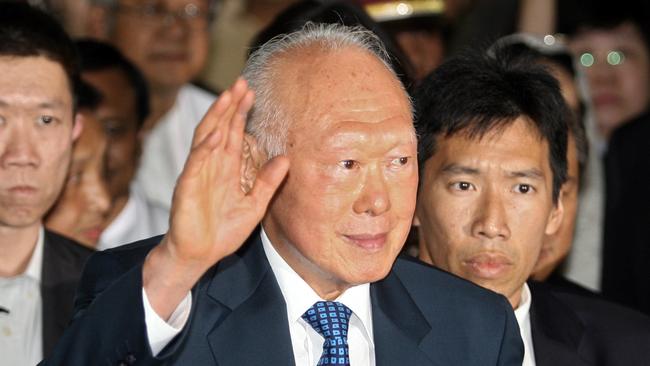
But he was criticised for his iron-fisted rule, forcing several opposition politicians into bankruptcy or exile, and once invoked Machiavelli in declaring: “If nobody is afraid of me, I’m meaningless.” Lee’s political career spanned 30 years as premier and 20 years as senior government adviser.
But in his last years, he was a shadow of his old self as his health deteriorated following his beloved wife’s death in October 2010.
He remained revered by many but also became the target of scathing attacks in social media as some Singaporeans began to muster the courage to speak out against him and the political and social model he had bequeathed.
His impact, through his policies and via his son, current Prime Minister Lee Hsien Loong, is likely to be felt for years to come.
President Barack Obama called Lee a “giant of history” as well as one of the great strategists of Asian affairs.
“A visionary who led his country from Singapore’s independence in 1965 to build one of the most prosperous countries in the world today, he was a devoted public servant and a remarkable leader,” Obama said in a glowing tribute.
“I personally appreciated his wisdom, including our discussions during my trip to Singapore in 2009, which were hugely important in helping me formulate our policy of rebalancing to the Asia Pacific.
“He was a true giant of history who will be remembered for generations to come as the father of modern Singapore and as one the great strategists of Asian affairs.”
Obama met with him during a trip to Singapore in 2009 and credited the former prime minister Sunday with helping him reshape U.S. policy toward Asia. Obama described Lee as a visionary and a “remarkable leader’ who led Singapore from its independence in 1965 to its days as one of the world’s most prosperous nations.
Foreign Minister Julie Bishop said Lee’s death was “very sad news” for the people of Singapore.
“He was a towering figure in the development of Singapore, he was a huge figure on the world stage, and I know he will be greatly missed,” she told ABC Radio.
“He had such a profound influence on Singapore – indeed, on the Asia-Pacific – and a giant the likes of whom we probably won’t see again.”
Thrust onto world stage
Lee Kuan Yew first became prime minister after Britain granted Singapore self-rule in 1959 prior to its stormy post-colonial union with Malaysia.
Six years later, he was thrust onto the world stage when he became the leader of a fragile new republic after the largely ethnically-Chinese Singapore, with just two million people, was ejected from the Malayan federation.
President Barack Obama is paying tribute to modern Singapore’s founding leader, calling him a “giant of history” as well as one of the great strategists of Asian affairs.
Foreign Minister Julie Bishop said Lee’s death was “very sad news” for the people of Singapore.
“He was a towering figure in the development of Singapore, he was a huge figure on the world stage, and I know he will be greatly missed,” she told ABC Radio.
“He had such a profound influence on Singapore – indeed, on the Asia-Pacific – and a giant the likes of whom we probably won’t see again.”
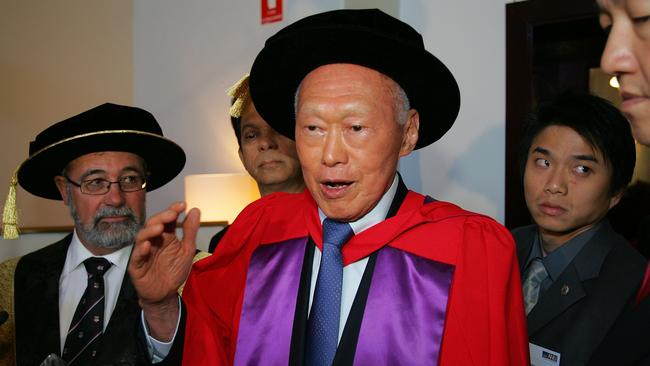
‘Improbable chance of survival’
“We faced tremendous odds with an improbable chance of survival,” Lee wrote in his memoirs.
“We inherited the island without its hinterland, a heart without a body.” But under his stewardship, Singapore courted international capital and used foreign labour to plug its manpower gap until it became one of Asia’s wealthiest, safest and most stable societies.
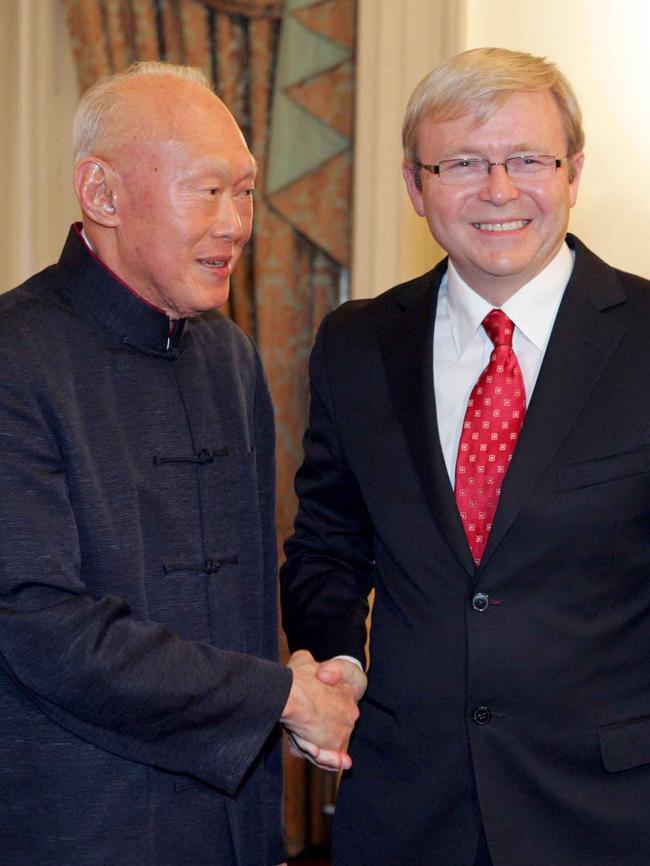
Despite criticism of Lee’s autocratic rule, Singapore was widely hailed as a model for development during a period when it soared above other former colonies that endured conflict and economic mismanagement.
Dismissive of liberal democracy, Lee anticipated the emergence of China as a world power and established close links with Beijing, giving Singapore investors enviable access to the giant market.
At the height of his powers, a number of opponents went bankrupt or fled into exile after being ordered to pay hundreds of thousands of dollars in defamation damages to Lee and members of his inner circle, while alleged radicals were held without charges under internal-security laws.
Lee also launched what critics called a “nanny state” that urged highly educated Singaporeans to intermarry and produce smart babies, banned sales of chewing gum and hectored its public about spitting on the streets and failing to flush public toilets.
Lee Kuan Yew was a rare statesman, both in Asia and the world, who always saw the big picture and we shall miss his counsel.
— Kevin Rudd (@MrKRudd) March 22, 2015
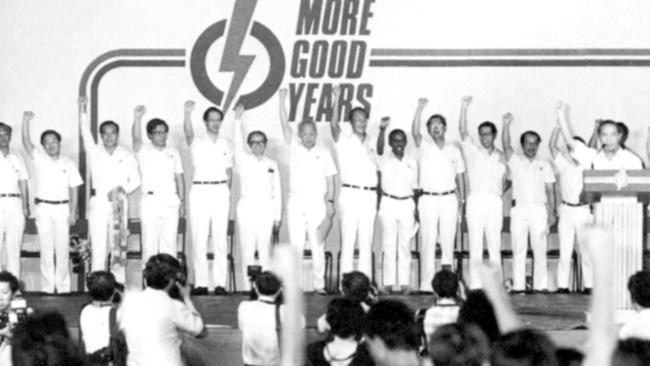
Brutal wartime education
Born on September 16, 1923 to a 20-year-old father whom he described as a “rich man’s son, with little to show for himself” and a 16-year-old bride in an arranged marriage, Lee grew up thinking British colonial rulers were invincible.
He had a rude awakening during World War II after Japanese invaders easily overran British forces and took over Singapore in 1942, shattering the myth of European supremacy in Asia.
“The dark ages had descended on us. It was brutal, cruel,” Lee said of the Japanese occupation, calling it “the biggest single political education of my life because, for three and a half years, I saw the meaning of power”.
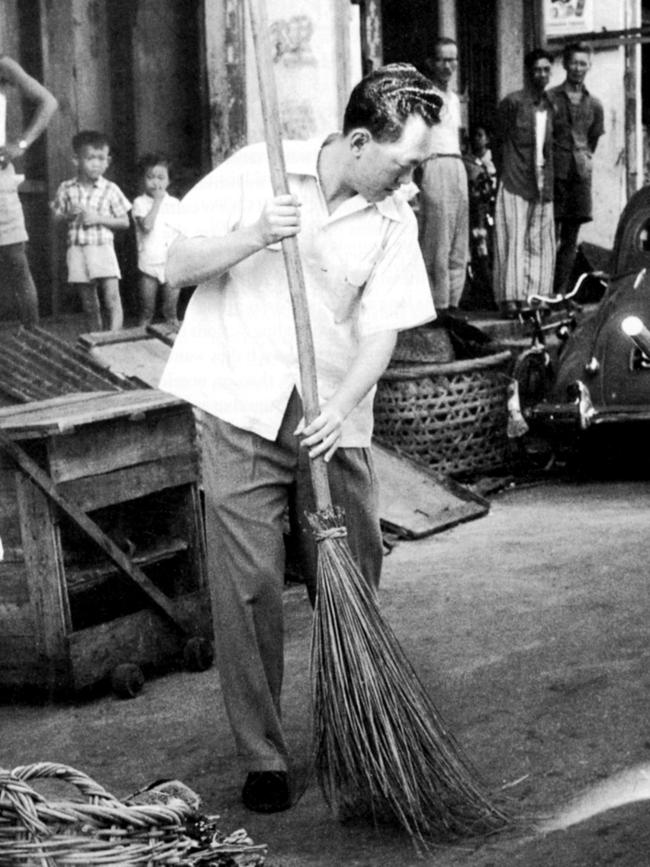
Lee survived massacres of civilians and at one point worked for Japanese propaganda. After liberation, he left to study law at Cambridge, where he secretly wed his classmate Kwa Geok Choo before returning home in 1950.
Lee was shaken by Kwa’s passing after more than 60 years of marriage and admitted that “at this moment of the final parting, my heart is heavy with sorrow and grief”.
They had three children, the oldest of whom is Lee Hsien Loong. Daughter Lee Wei Ling became a doctor, and son Lee Hsien Yang became a top corporate figure.
Lee stepped down as prime minister in 1990 and handed power to his deputy Goh Chok Tong, who in turn gave way to the veteran leader’s elder son in 2004.
In 2011, he stepped down as a cabinet adviser after the ruling People’s Action Party suffered its worst performance yet in a general election, its share of the vote falling to a low of 60 percent.
Lee, as the founder of modern Singapore helped transform the sleepy port into one of the world’s richest nations.
Lee was admitted to Singapore General Hospital on February 5 for severe pneumonia and was later put on life support.
The Prime Minister’s Office said in a statement on Facebook that Lee “passed away peacefully” at 3:18 a.m. Monday.
Lee was feared for his authoritarian tactics but insisted that strict limits on speech and public protest were necessary to maintain stability in the multiethnic and multi-religious country.
He guided Singapore for 31 years until 1990, making it into a global trade and finance centre.
Lee commanded immense respect among Singaporeans, who this year will celebrate the country’s 50th independence anniversary.
Singapore mourns death of founding father
State television broke away from regular programming with a hagiographic tribute to Lee’s life. In a live broadcast, one of its reporters called Lee’s death the “awful and dreaded” news.
Lee commands immense respect among Singaporeans, who this year will celebrate the country’s 50th anniversary of independence. He is credited with transforming the resource poor island into a wealthy bustling financial hub with low crime and almost zero corruption.
At the hospital where Lee spent the last weeks of his life, 55-year-old Maligah Thangaveloo cried as she clasped her hands in prayer before an expansive array of flowers and cards left by Singaporeans. Calling Lee “father,” she recalled shaking hands with him as a nine-year-old when he visited her school.
The Singapore government has declared seven days of national mourning and flags will fly at half-mast on state buildings.
Obitiary with Agencies




To join the conversation, please log in. Don't have an account? Register
Join the conversation, you are commenting as Logout